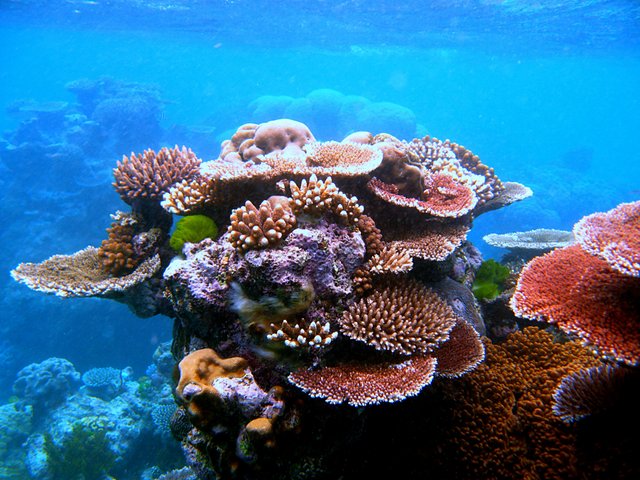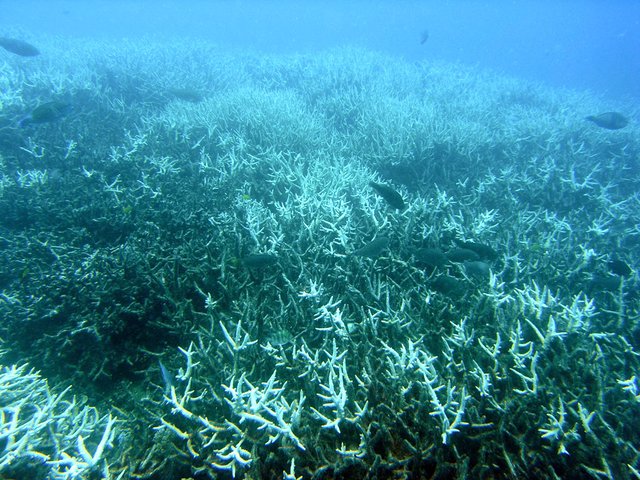New research has found that certain parts of the Great Barrier Reef might offer opportunities for regeneration of most of the reef
We are constantly hearing about the coral bleaching that is happening all over the world, where corals are heated by the increased global temperature, and ends up killing the symbiont that lives within the polyp. This is bad news, and over just a few years a whole reef can die from the bleaching, and we don’t really have any way to prevent this from happening. An estimated 70 % of the shallow water corals in the Great Barrier Reef have already died, and there’s no reason to think this trend will stop anytime soon.

Corals in the Great Barrier Reef. Image by Toby Hudson, posted with the Creative Commons Attribution-Share Alike 3.0 Unported license.
We are often told that the entire Great Barrier Reef (shortened GBR) is doomed to die from bleaching unless we take immediate action to stop the global warming, and this seemed like what would happen. Luckily new research has shown us that this might not be the case, and that the coral reef might just be able to regenerate on its own after a bleaching event kills most of it.
The GBR consists of over 3,800 individual reefs that all have their own ecosystem. The problems the reefs are facing tend to spread from one of these reefs to the next, but new research from University of Queensland, CSIRO, the Australian Institute of Marine Science, and the University of Sheffield have found 100 reefs that might act as a “failsafe” in cases where most of the other reefs die.
The reasons why these reefs are of such importance is because they all lie in areas that are cool, and should not be affected by bleaching events. This allows them to reproduce and supply larvae to other nearby reefs in the future. Many of them are also located in areas close to ocean currents that can take larvae from these healthy reefs into reefs far away, and are thus able to regenerate most of the Great Barrier Reef even after most of it has died.
These 100 reefs only make up 3 % of the entire GBR, but they should be able to supply larvae to 45 % of the entire GBR. This means that far from the entire Great Barrier Reef will be able to be regenerated, but almost half of it is a lot better than the other futures that have been predicted for it!

Bleached corals. Not as beautiful as the corals in the first picture! Image by Acropora at English Wikipedia.
Does this mean we should not worry about the reef anymore?
Absolutely not. We should still focus efforts on taking care of both the Great Barrier reef as well as all other reefs who are facing problems today, because we have no insurance that these regeneration-parts even work. It’s just a theory at this point, and it might take very long time before the reef will become healthy again. It is always best to take care of what we got in the first place, instead of trying to fix it after it is broken, so the problems with the coral bleaching should still be taken just as seriously.
Thanks for reading
I linked to the paper earlier in the post, but here it is again if you missed it. It’s a very interesting read on the Great Barrier Reef. Anyway, thank you very much for checking out my post! Feel free to leave a comment below if you got anything you want to add.
There's also some interesting nascent research in the states looking at lab growing strains of coral that are resistant to higher temperatures and using these to seed the reefs. If it took off on a larger scale it could be quite exciting for recuperating reefs. There are two interesting youtubes on this here and here.
Wow, that's really interesting. I still think we are at a point where we should be very careful before we release any modified organisms back to the wild like this, but projects like this is certainly very interesting to keep an eye on!
Well it's interesting that they're simply selecting the strains that survive exposure to the warmer water, so they're not drastically modified!
While that is a good point, putting out modified organisms can have very unexpected consequences despite the changes not being that big. I'm not saying that it is a bad thing to put these things back into nature in order to regrow the lost coral reefs, but if they are much better adapted to surviving, then it's too late to change our mind once it's done, and there might not be anything we can do about potential negative consequences.
I'm being a bit silly now but I just got a visual flash of that 1980s film "The Blob", but mentally replacing it with coral polyps...
That's good news at least - I'm ready to take any decent news at this point as far as the natural world is concerned.
Yeah, good news is very rare compared to bad news when it comes to nature and conservation of species :/
Great read @valth, thanks for sharing this. People often forget about our reefs and how important they are.
Thanks, I'm happy to hear that you liked my post!
And you are right; many people forget or are completely unaware of their importance.
Nice view under the sea
I'm glad you liked it.
Excellent post!
Thank you.
@originalworks
The @OriginalWorks bot has upvoted and checked this post!
Some similarity seems to be present here:
http://diekaltesonne.de/
This is an early BETA version. If you cited this source, then ignore this message! Reply if you feel this is an error.
I'm sure this is an error ;)